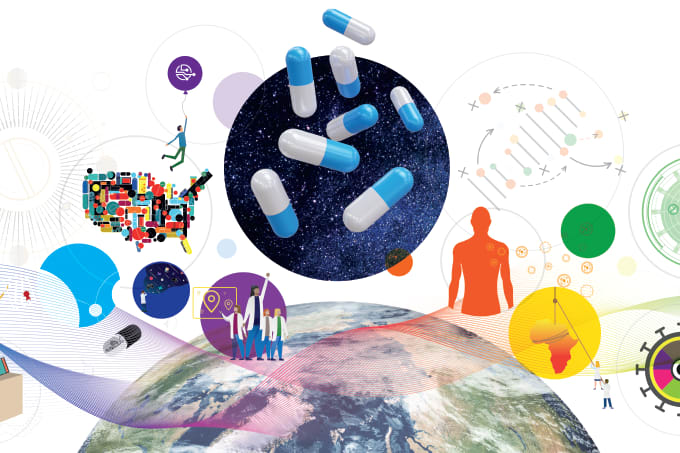In my view, one of the most exciting aspects of blockchain is its potential to revolutionize the way the pharmaceutical industry exchanges data. Electronic medical records, clinical trial management, supply chain, and scientific data sharing could all benefit from a distributed blockchain system, where data is managed by a cluster of computers, rather than any single entity.
One example of blockchain’s applicability in the pharma industry is the Drug Supply Chain Security Act (DSCSA) Saleable Returns Verification requirement in the US. By November 27, 2019, when a pharmacy returns a product, the distributor will be required to verify that the serial number on the bottle is the same as the serial number the manufacturer applied to the package, before it can be restocked and resold. In today’s environment, the distributor would have to connect with a manufacturer on a one-to-one basis. I work on behalf of AmerisourceBergen, which works with 450-plus pharmaceutical manufacturers. With our existing systems, the new requirement would mean taking the serialized bottle from a pharmacy, scanning it to assess which manufacturer it belongs to, and then asking them whether the serial number is valid – for 15 million units. A mammoth task!
What we need is a system that tells us which manufacturer we need to contact. At the moment, that decision lies in the hands of the person trying to process the return. A larger system could scan the serial number, which has a global trade identification number called GTIN, and use a directory (akin to a phone book) to understand which manufacturer the product belongs to. We started to look into this, but issues arose when we considered how to manage the “phone book.” Keeping it up-to-date would involve many manual interventions, such as phone calls, emails and so on. We also realized that we would run into problems if different manufacturers used different technologies. And that led us to consider a new avenue: blockchain.
Blockchain would allow us to communicate with a community or pharmaceutical ecosystem in a non-direct way. The request would go to into a pharmaceutical blockchain that could use the lookup directory to request information appropriately from the right manufacturer.
To implement blockchain, we’ve been working with a company called Chronicle through their pharmaceutical working group: MediLedger. But a key question is: what if companies don’t want to engage with blockchain technology? In the end, we’ve told our trading partners that if they don’t have a means of interacting with the new system, they need to encourage their solution providers to develop a means to transact in a blockchain environment. Without the ability to transact within a blockchain environment we won’t be able to process their return, which would mean that two percent of their products would need to be taken out of the supply chain.
I would urge pharma companies to seriously consider investing in blockchain. Traditionally, manufacturing and R&D, not data exchange, are key priorities for pharma companies. But if they can’t do basic data exchange then wholesalers can’t receive and process their information. We’re beginning to see a significant shift as companies understand that, if data doesn’t move when products move, we cannot deal with those products in the supply chain. As the regulatory environment changes with DSCSA and global serialization requirements, more companies are seeking to change their methodologies and enhance their abilities in data exchange. Blockchain is emerging as a tool that we can use to synchronize a significant amount of data, and have business rules over how, and who updates that data.. It allows a large company, like ourselves, to keep all of our data in one location, trust that data is accurate and that we can access efficiently and effectively.
Moreover, the industry has been forced to seriously contemplate the strength if its security systems given that numerous pharma companies have been hit with ransomware attacks in recent years. Merck, Sharp and Dohme had to halt production of new drugs in 2017 because of such an attack. As the industry looks for ways to shore up its IT systems, blockchain has risen as a potentially useful option. And with specific use-cases emerging, I believe companies will begin to see the real opportunities.
We used to say the pharma industry adoption curve was eight to 10 years for new technologies but, providing that regulators understand blockchain and are now a key stakeholder, I think that blockchain could be mainstream in pharma in just three to five years. There are a lot of opportunities with the technology, but the industry won’t convert for the sake of it. Blockchain must be cleaner, faster and safer – and I believe that, as use increases and we iron out the kinks, it certainly will be.




